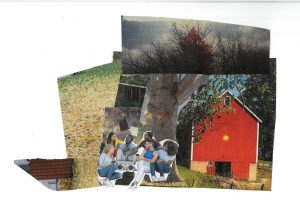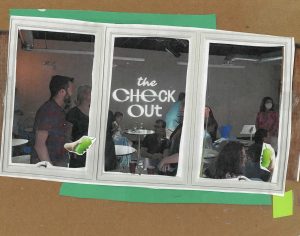This article was developed and written as part of Muña, an art writing program providing a cohort of six writers the opportunity to critically and creatively engage with art writing strategies, readings, exercises, and conversations. The program is structured for writers to develop and refine their practices through guided workshops and peer-review feedback. Its task is to stir, incubate, and pollinate shared consciousness on holistic, equitable, and attentive art writing and language practices. Muña is a program collaboration by Chuquimarca and Sixty Inches From Center.
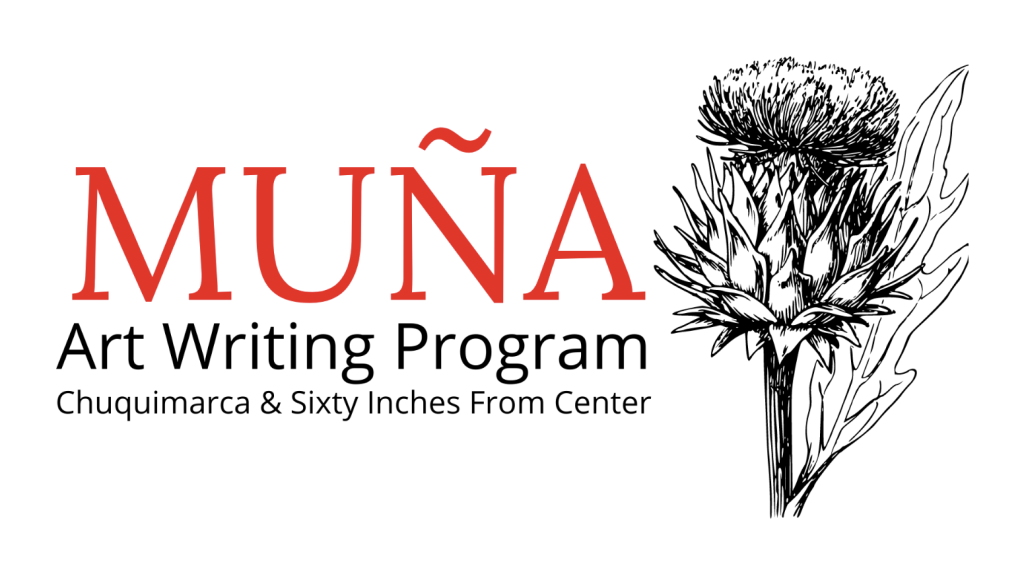
(Content warnings: suicide, death, abuse)
I.
Most people I know swear by the notion of crying on the CTA. Public transit and something about being able to let go of the superego in a group setting like that. I don’t diss it, but I can’t do it. I tried. On days when I felt like I had left my body — floating, projected out on metal surfaces and a dark tunnel between Cermak-Chinatown and Roosevelt, I tried: to cry or laugh — feel. Just animate my flesh by turning a switch on. Build magnets inside my body so next time I leave I can be pulled back in. All that to say, I honestly tried to cry — in a bus, a train, and believe me when I say, the Chicago red line will give you so much to cry about. The years 2020 and 2021 did too. On more days than I can remember the train car was filled with Black and brown bodies making ourselves tiny till the crowd departed at Addison or Belmont. The red line smells of marijuana smoke and doubles as housing on most days. We are all here, working, all hours of the day, working to bring home groceries, masking up to work overtime, trying to make it all work. Choose your own reaction here.
This one time I cried while waiting for my bus because my sister got married and she didn’t tell me, despite the Whatsapp group bursting with images and videos from the ceremony. There was a Zoom call, I set it up because they didn’t know how to. I cried in outrage ‘of how could they.’ When I got on my bus, I looked around to see if anyone spotted me, it was broad daylight; did they know I was swallowed up in hurt? Was it loud? Fortunately, no one had — Chicago has its own problems. I put on my earplugs and Dave Grohl asked if “I was born to resist or be abused?” I cried harder. This isn’t the first time Grohl has sung this one for me. This song knew me.
Released in 2005 by the Foo Fighters, “Best of You” was not designed to become an anthem. On the album In Your Honor, it is track number three, that time when you have made up your mind about the tone of the album — this is where you slow down and decide if you want to hear the whole album or not. Dave Grohl has said that the song was written after appearances at 2004 American presidential candidate John Kerry’s campaign and is “about breaking away from the things that confine you. Most people think it’s a love song but it’s meant to be more universal, which I think is one of the reasons so many people sing along when we play it,” Grohl laughed once in an interview when asked how that song became so popular.
American presidential campaigns, just like American music, reach so far in the world. In 2005, I was 13 and walking out of my house, hoping someone would stop me or notice me gone. Home was a warzone of heartbreak and hurt and unmet needs and expectations and affairs and I needed to be somewhere else. I hid inside a temple facade for three hours and, there, found this scream of a song. There was a lot wrong in my world which I had no language to speak in…but Grohl did. In the tiny town of Nadiad, Gujarat, teenagers found music through UTorrent. You looked up a genre (or an artist if you knew them) and found an album; if the name felt interesting enough, you would download it. For free — if you knew how. I cannot claim to remember much of what was around. The world, as I understood it, did not stop, or shift but, now, had a new soundtrack.
II.
The music video, directed by Mark Pellington, was rumored to be inspired by the death of his wife. In the video, the band is playing on top of an abandoned hospital roof. The song starts with Grohl in a closeup, singing a confession into a metal microphone grid. While the band plays, the video lives in choppy shots.
Most of it feels random. There are clips of children playing alone, playing with each other, one girl hugging another, a car crash, a lion pouncing on its prey — a vulture, a zebra kicking another zebra, a wolf, crash test dummies being crushed in a test, a snake attacking a mouse, a newborn baby sleeping, a nuclear explosion, a baby crying, a mother and child laying on the bed, a wall covered in writing with phrases like “Help me,” “Pain Feels Good,” and “They all died in the fire I started.” At face value, it all feels weird…but it resonates. It’s not like the song is about only one thing even though Grohl sings about resistance. Resistance and abuse and wanting to run are more than just one thing. The song is loud and guttural and the video feels like it wants to echo into spaces where screams live.
What does emerge is a shriek of sorts; Grohl mostly screams the whole way through. During the first rehearsals, Grohl came close to injuring his throat, but eventually decided he could pull it off, saying, “When you go out and sing words from the heart, you scream twice as hard.” The Foo Fighters have made the scream a thing, under the song, under the lyrics, under the production. A primordial need to scream is so easily satisfied in a Foo song: a song you can sing, dance to, sing along to, and — more than anything — scream to. I know they didn’t write it for a little brown girl wishing she was a silhouette in the 2000s, but there I was. Screaming. It felt like it lived between my gut and esophagus, repressed by cough syrups and saltwater without permission to live in my own voice.
III.
Abuse is funny: you can see what it means, arm yourself with books and words and information to recognize it, and yet, with all the tools I have now, I don’t know if I would have been able to leave then. Back in 2016, the man I loved did not love me back. He loved someone else, who also did not love him back so he and I kept pulling and pushing at each other with the force of a magnetic field unable to turn our backs and flip sides. I kept being in his orbit without wanting to. He kept kissing me pretending I was someone else. I mistook all of it for something that would eventually become love. We’d kiss. Hug. Spend the night; every night I would wish he would see that I am here and the other woman is not. I would stay awake all night because I was afraid to fall asleep. Here, in the awake, he still wanted me, his hand was around my waist and he was pulling me close. Eventually, in the morning he would wake up and call it a mistake. Every single time we spent the night, he’d call it a mistake.
I’d imagine myself a wall hit by a hammer, again and again, and I wouldn’t break. When I asked for more, he’d call me selfish, remind me I don’t get to ask, get angry that I’d find my voice when it was most inconvenient for him. Anytime I did not speak, he’d hate me for being meek; anytime I did, he’d shout louder. On and on it went: shouts became hammers into walls into breaking into fragments of oneself till I was powder, free falling into whatever shape took me in or let me stay without cleaning me out the next day.
At its most reduced, “Best of You” is about a scorned lover or an embittered relationship; at its fullest, it can be about politics, and in this differentiation lies my problem. The separation of the two has never been a strong suit of mine. When I was young, I did not know what to call safe. If you grow up thinking abuse is how love manifests (“if only you were better, smaller, caused less trouble, learned to hide better or make yourself more useful”) it becomes how you fall in love, how you keep looking for it. I was searching for a voice without looking like I did anything to find it. I wanted to free fall into a song. Or a lyric. As Grohl once said, “‘Best of You’ is a song of resistance. It’s about the refusal to be taken advantage of by something that’s bigger than you, or someone you’re in love with. It’s the fight in the face of adversity.” It starts in one place, it keeps building, and then it comes back down at the end — a breath. A silence. A moment of catharsis. I was here, and still alive. I am not powder yet.
IV.
The Foo Fighters started in 1994 as a one-man project after Kurt Cobain died. Cobain had a widely-known fascination with death and pain, a man always steps away from ceasing to be, mid-flight or mid-scream. Grohl couldn’t be in a band for months after the suicide, famously playing all the instruments himself for his first record post-Nirvana. I like to imagine him writing and recording first the lyrics, then the guitar and the drums, one by one, because maybe he couldn’t trust people to not die on him. Wouldn’t it be easier to do it all yourself rather than let someone in and risk losing them? I have never been in a band, but I imagine the songwriting process to be a little bit like falling in love.
Famously, the name Foo Fighters did not really mean anything. It was a nickname coined by Allied aircraft pilots for UFOs and other aerial phenomena. Grohl didn’t mean to form a band; he calls the discovery of the band and the name itself “really fucking stupid.” Maybe it was easier to believe in aliens than look grief in the eye. I wonder how grief alchemizes itself to become anything other than itself; its reptilian tendency to slither in and shapeshift is really inconvenient. Imagine if Dave Grohl had been able to claim grief and sadness and pause the world with a switch till he was able to walk out or make music or trust people not to die. Wouldn’t it be convenient to name one thing and get over with it?
A friend of mine was in so much pain in 2017 that, instead of screaming, he quietly jumped off a roof. It wasn’t till I found myself crying in the CTA in April 2022 that I fully processed it. As Grohl kept screaming in my ears, I could finally grasp what I avoided naming: drummer Taylor Hawkins was dead and there would be no more Foo Fighters. I remember thinking about this in 2017 when there were five deaths, one after another, in my life. I wrote lists after lists of things I wanted to do, say to the people I love, and experience while people I admire are still alive. Watching the Foo Fighters play “Best of You” was one of them. I worried they would end before I could see them. My friend was dead before I could tell him how much we love him. I cry on the train till I reach home and I play the song on my speakers and scream till it is time to sleep.
Here I am writing about it, and about Hawkins and the Foo Fighters and the death of Cobain and Nirvana, and being shrouded in death is what is making this essay happen. I am the bereaved, grieving and writing to write myself out of it. If this is an essay about pain, who gets permission to read it? When you read this, will it become a vessel to hold your pain, to transform, it or will you Tweet it, repost?? Here’s a pain, consume. It has no melody but looks pretty and you can chew on it if you try.
Dave Grohl refused to give interviews or tour even after his first album got so much attention he decided to form a band. Maybe he, too, was making himself small to not take away from the tragedy of Cobain and the grief of losing his radical talent. I imagine taking anything away from that grief being wrong. I often find myself wondering about how we look at attention as a zero-sum game. Maybe that is because I am a woman or a brown woman in the US or even just a person in this world. This idea of taking something away from one thing by being something else feels so wrong…and yet so normal; maybe writing this, or making that first Foo Fighters record in 1995, was a way of building stronger emotional tables. It was possible to pay attention to what was lost and care for the living; grief and abuse and love all also lived in the same place.
V.
It starts with paperwork, as all things do. Income statements, property papers, assets, and liabilities, and your or your parent’s ability to afford tuition for the next two years, which you need to show up on accepting admission. Applying for a visa comes next. Proving that you deserve to come to the US, study, get a job in your field, and stay beholden to our jobs is a daily way of life for so many of us. If you ask me for my 2nd I-20 issued in March 2019 — the first and last time I visited home — I could whip it out in under a minute. I keep documents to prove myself worthy, handy. They are multiple, copies after copies, attested by lawyers and the American government to make sure I know my place. If you put all 72 pages together, you get a picture of a person pleading regularly to a system that promises them nothing long-term, nothing too much, just enough to stay, right now. When I say this out loud, I am considered ungrateful — this is the price you pay to live in this mirage of a country that only exists in our imagination.
Once you become Of This Country, get yourself certified in American-ness, you are suddenly more worthy. You are guaranteed jobs in my country of origin, respect, and more often than not, the assumption that you are maybe a little bit more deserving to be a human. Your outlines are darker and your colors contrast just enough to seem shiny. Suddenly being worthy in the US is your most important document. The man I loved missed me so much — my newfound access into the US made me desirable. Helpful. I had opened a door, I could help from the other side now. And while a lot of us strut in our American accents with our mineral water bottles in India, most of us don’t know why we stay here, in America most of us are just fumbling around dark rooms, occasionally lucky enough to find a light switch. Most of us are so used to the flogging that we are now in love with it.
If I went back home, I would be happy. Comfortable. All my friends have done that; so did my sister. A big job with big money with family around and friends from all my life in the vicinity. No cards, no paperwork, no citizenship test; no immigration knocking on my door, asking if I still live inside the lines. Maybe a lot of us have different versions of a safe space that we are hoping to build here, but we often end up fearing every step we take, every tax statement, every traffic stop, and every protest picture we might end up in. Yet I stay. I have a home here now. Yes, I read the immigration section of the newspaper every day and keep all my paperwork handy in case I have to prove why I am here. It feels safe inside this day-to-day game of “prove you are good enough.” I know the words, I have the papers. I pay the fees. Maybe I like the abuse now.
VI.
At Lollapalooza 2021, mid-pandemic, in the tiny sliver of the opening between Delta and Omicron, 385,000 people gathered together to sing till our throats were raw. By then, 515,151 people had died from COVID-19 in the United States. We were (are) nowhere close to the end of this pandemic, and we were grappling for hope. I didn’t know why I was still there, alive, in this country, in this venue surrounded by strangers when touching another human body was potentially lethal. We were all here, waiting for this one band, singing till they arrived, till our bodies were so tired we were floating, till dancing in sync was the only way to move. We were sweaty and triple-masked. I was blurry and open-mouthed and so in my body that when Grohl came out and shouted “hello, motherfuckers,” it felt like he saw me. Grohl played an aqua blue guitar while Hawkins played on his pink drum set and all of us had our phones out: not recording, but lighting up the torches in our phones.
I was. There.
I had written about this in my list of things to do before people in the band died. Or I died. Or the country threw me out. I had waited so long for this one, and I was not alone. Behind me, a girl from Australia who was leaving the country before her visa expired: “no jobs on OPT,” she told me. Next to me was a man whose wife could stay in the US, but only as a nurse without permission to work. I had just gotten a job in a tiny non-profit where I worked crazy hours and made 1000 dollars a month, but I could afford rent and food. We were immigrants in that tiny circle and none of us knew where our next jobs or homes were going to be. We were here because we feared losing our visas, our families, our income, and our ability to work and provide for ourselves and buy vegetables for the next couple of months, fighting for a chance to stay.
Foo Fighters has, for nearly three decades, stayed true to their sound and scream — their songs are not pretty, not Mitski, and not new. They keep creating, just making music, no matter how good or bad anyone says it is; the melodies are stretched thin from years of use and reuse, but the thing about the Foo Fighters is that they are undeniable in their charm, their joy, and love for rock.
We had stolen, sourced, copied, and translated this song. It had moved with us through abusive relationships, neglect, survival, death, immigration, and a pandemic. People had lived and died and I am not the same person I was when I first found it. Maybe when Grohl wrote this song, it was an easier binary: born to resist or be abused was an either-or situation. I often found myself wondering why I lived in between these two. But I was not alone. We were born to keep resisting the abuse. We were parts of a system that wants us to keep resisting. And on some days, a song that kept you company.
We were all here. We made it. We were singing.
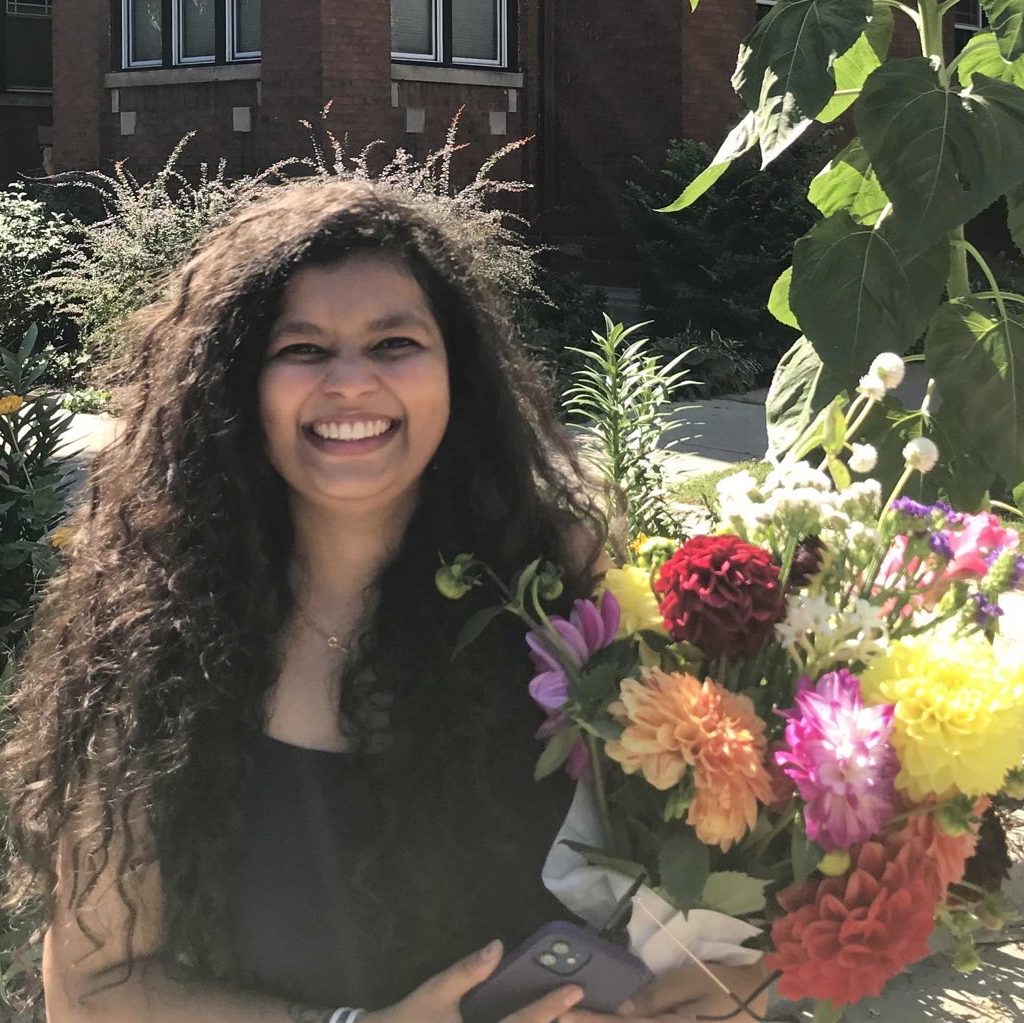
About the author: Darshita Jain is a Chicago-based poet, art critic, arts administrator, and a voracious consumer of content, matched only by her need to converse critically about the said content. Her work takes the shape of exhibition direction, art journalism, writing, performance, and non-profit arts administration. She received her MA in New Arts Journalism at the School of the Art Institute. Darshita has been writing and developing tools to educate and build a critical lens to life and culture for the last eight years. She currently works as the Director of Outreach and Artist Programs at Lillstreet Art Center in Chicago.
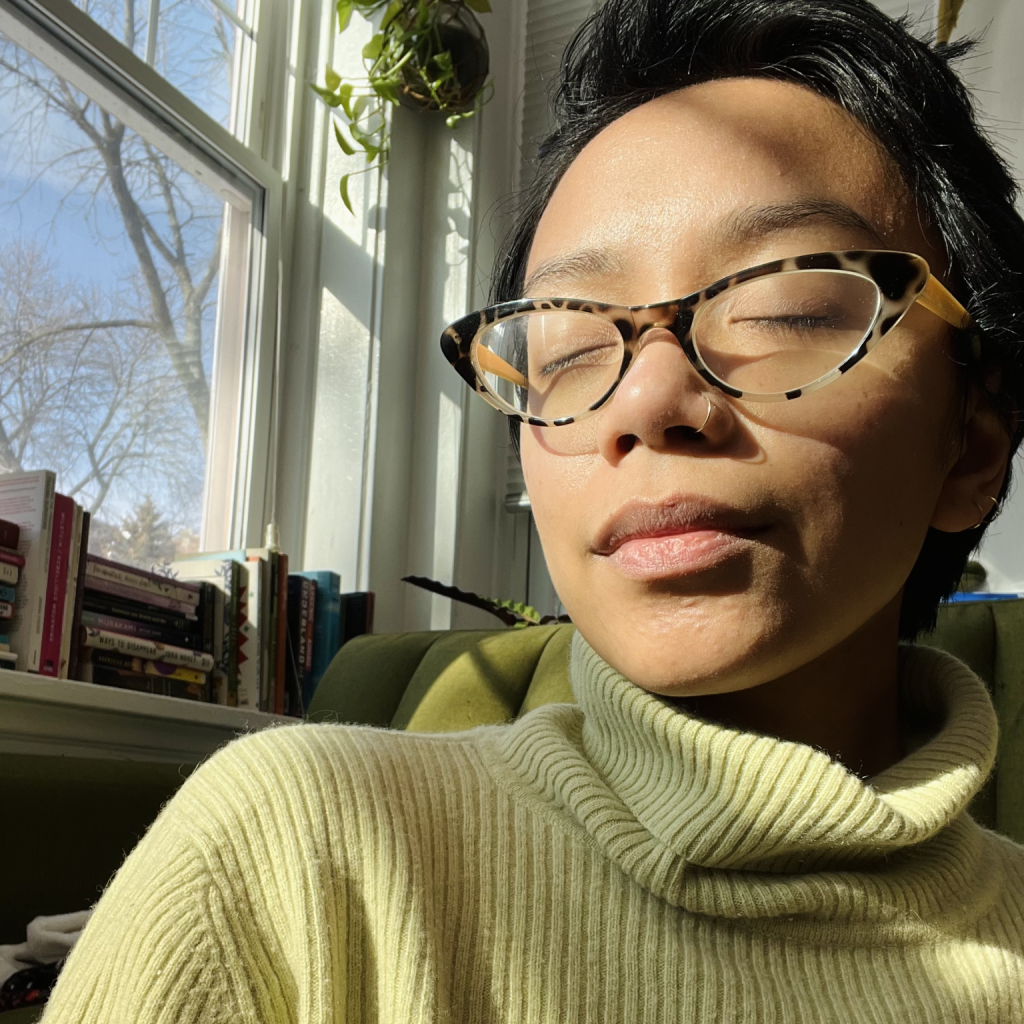
About the illustrator: Peregrine Bermas is a creative and curious earthling living in their birthplace, so-called chicago. Their practices include illustration, ritual, somatics and herbology. As a community herbalist, Peregrine is passionate about holding space for remembrance of ancestral, kitchen-accessible and bioregional medicine.

